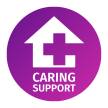What It is Like Being A Healthcare Worker During A Pandemic in Canada
A healthcare worker during a pandemic

As a healthcare worker, the COVID-19 pandemic has been hard on all of us, but apart from the families that have lost loved ones in this global health crisis, nobody has suffered more than healthcare workers around the world. Here in Canada, where the virus has infected 1.2 million people to this date, including almost half a million in Ontario; healthcare workers report being exhausted and sometimes discouraged, but they also demonstrate their strength and resilience, which is why they have earned the respect of patients and their family members more than ever before.
In this special article, we have gathered the testimonies of six local healthcare workers, who told us what it is really like to be a part of the medical field and work as a healthcare worker during the COVID-19 pandemic.
“Covid has ruined most of our lives and has affected me personally on a day-to-day basis at work by these unnecessary lockdowns. Being a frontline worker, I have seen firsthand the rise of unemployment, depression, and suicide attempts. Also the rise of murders, domestic violence, and lastly opiate consumption causing deaths. This has affected my attitude at work. I feel defeated as if no one is listening; as if you are immediately discredited when you attempt to become a voice for these people in poverty, victims of violence and addiction because I feel this pandemic is much more important to those who matter more (geriatric demographic with generational wealth and influence). This virus is serious, do not get me wrong, it is fatal and it is unbiased on whom it affects, but who these lockdowns affect most is targeted, alienating, and much more harmful than we could possibly imagine” – Paramedic from London, Ontario.
“The most difficult part of my work as a healthcare worker during COVID-19 would have to be having to work short-handed constantly. Staff is either calling in sick with symptoms or taking leaves of absence due to stress. This increases the workload immensely and I think that it has affected me emotionally. I also feel very empathetic towards my patients who are alone in the hospital during their stays without any visitors allowed." – Registered Nurse at the London Health Science Centre.
“Prior to COVID-19, I felt confident in my skills, ability, knowledge, and eagerness to improve my care and performance. No matter what the situation or medical issue was, I either knew how to handle it or knew what other resources to access if I didn’t have the answers or solution.
However, when the virus first broke so many of our protocols and ways of caring changed; a number of these changes were needed and prudent, but not all. Our physician oversight took away a number of treatments that had respiratory components to them fearing possible increased exposure risk to the health care worker during the pandemic.
Over the past year, I would encounter the same presentation I had seen countless times pre COVID-19 and known what to do; but now those same treatments have been taken off the table. This has brought me a sense that my role is insignificant or little more than a babysitter or taxi driver.
The other aspect difficult about protocol changes was the feeling of losing competence in a skill. Very early on we were directed to no longer intubate critically ill patients unless all other means failed. This was not the troubling part as we did have other alternatives. What has become very hard is how much of this skill and medical procedure I feel that I have lost over the past year of performing it minimally. Now when I encounter situations where intubating is needed I feel rusty or shaky; I find myself missing on attempts in situations I would have had no trouble with before. It is a very self-destructing feeling when you fail another person in that way when you go into health care wanting to help others. I worry how much of the good we did pre COVID-19 will be lost post-COVID-19 as this pandemic drags on longer and longer.” – Healthcare worker from London, Ontario.
“Covid has garnered significant changes regarding work environment and relationships among colleagues. Prior to the pandemic, my workplace was known for its outstanding morale among colleagues. Working in a high-stress environment can be exhausting, but we have a young staff with similar interests who enjoyed having potlucks while at work and having nights out on our days off. We also individually had other outlets such as sports, family, friends, or traveling to cope with pent-up stress. Individually these small but powerful practices allowed us to channel and relieve the toll this job can have on us.
The pandemic has disallowed any and all outlets for work-related stressors to be used. More people than ever are leaving nursing and the healthcare system altogether due to unfair compensation for their work and unpaid sick leave. This leaves not only the stress of a global pandemic but an unprecedented nursing shortage leading to unsafe staffing ratios. Pressure to work overtime to save your colleagues from working short is causing a significant increase in staff and nurse burnout. Morale is at an all-time low with seemingly no end in sight. At this point, management doesn’t have an answer to the lack of heart left for this career, because they too are feeling the weight of constant restrictions and lack of support. Nurses are being left in the wake of this never-ending storm, mustering any compassion and empathy they have left to continue to show up every day.” – Nurse from London, Ontario
“COVID-19 has impacted my typical day-to-day at work significantly as I am a screener at the London Health Sciences Centre (LHSC), which requires me to analyze and question patient/visitors and staff members on whether they have any signs, symptoms, or exposures to the virus. As a result, this puts me in a more vulnerable state. Even though we are behind screens and wear proper personal protective equipment (PPE), I know I have a higher likelihood of catching COVID-19 and this has impacted my daily habits. For instance, washing my hands more frequently, wearing a protective level three mask, and eating/ drinking at appropriate locations that are a low-level risk.” – COVID-19 Symptom Screener at St. Joseph’s.
“Being a frontline worker initially made me feel afraid, but mostly for my family. At the beginning of the pandemic when not much was known about COVID-19, my wife and child left the city to her family in a rural area with less exposure for several weeks while I went to work and wanted to build immunity before they returned. As time went on, more information came about hospitalization and death rates among my age group, my wife and child returned and restored some of my mental health.
Being a frontline health worker during the pandemic now is disheartening. I'm making a paycheque every 2 weeks, while others are likely struggling to make ends meet. Seeing the consequences of the lockdowns firsthand has been heartbreaking, to say the least. So I suppose in the early uncertainty I would sum up my emotions as terrified. Now it's more of a broken spirit.” - Paramedic from London, Ontario.
Source: https://www.caringsupport.com/blog/whats-its-like-being-a-healthcare-worker-during-a-pandemic






Comments
There are no comments for this story
Be the first to respond and start the conversation.